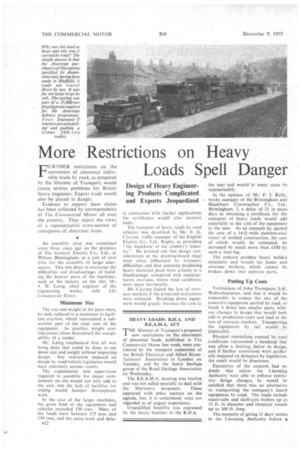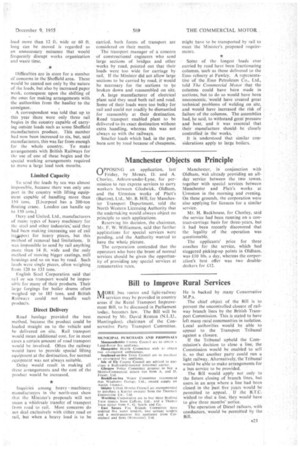More Restrictions on Heavy Loads Spell Danger
Page 56

Page 57

If you've noticed an error in this article please click here to report it so we can fix it.
FURTHER restrictions on the movement of abnormal indivisible loads by road, as proposed by the Minister of Transport, would create, serious problems for British heavy engineers. Export trade would also be placed in danger.
Evidence to support these claims has been collected by correspondents of The Commercial Motor all over the country. They report the views of a representative cross-section of consignors of abnormal loads.
An assembly shop was completed some three years ago on the premises of The General Electric Co., Ltd., at Witton, Birmingham, at a cost: of over Lim. for the assembly of larger alternators. This was done to overcome the difficulties and disadvantages of building the heavier parts of the machines, such as the stators, on the site, Mr. J. W. Laing, chief engineer of the engineering works, told The Commercial Motor.
Minimum Size The size and weight of the parts were he said, reduced to a minimum to facilitate erection, which represented a substantial part of. the total cost of the equipment. . In practice, weight considerations often determined the acceptability of a tender.
Mr. Laing emphasized that all was being done that could be done to cut down size and weight without impairing design. Any restriction imposed on design by road-vehicle legislation would have extremely serious results.
The organization and supervision required to assemble the major components on site would not only add to the cost, but the lack of facilities for testing would hamper development work.
In the case of the larger maehines, the gross load of -the equipment and vehicles exceeded 150 tons. Many of the loads were between 125 tons and 150 tons, and the extra work and delay B22
Design of Heavy Engineering Products Complicated and Exports Jeopardized
in connection with further applications for certificates would also increase costs:
The transport of heavy loads by road vehicles was described by Mr. E. G. Clayton, traffic manager of the English Electric Co., Ltd., Rugby, as providing "the backbone of the country's industry." He pointed out that design considerations at the drawing-board stage. were often influenced by transport difficulties and that concerns producing heavy electrical plant were already at a disadvantage, compared with manufacturers overseas, where road conditions were more favourable.
Mr: Clayton feared the loss of overseas markets if the proposed restrictions were enforced. Breaking down equipment would greatly increase the cost to
the user and would in many cases be -impracticable, In the opinion of Mr. F. J. Kelly, r works manager of the Birmingham and Blackburn Construction Co., Ltd., Birmingham, 2, a delay of 21 or more days in obtaining a certificate for the transport of heavy loads would add materially to the cost of the equipment to the user. As an example he quoted the case of a 14-ft.-wide stainless-steel vessel of welded construction, the cost of which would, he estimated, be increased by much more than 1100 by such a time-lag.
, The concern produce heavy welded structures and vessels for home and overseas markets, which cannot be broken down into separate parts.
Putting Up Costs
Technicians of John Thompson, Ltd., Wolverhampton, said that it would be impossible to reduce the size of. the concern's equipment carried by road, or break it down into smaller parts, without changes in design that would both add to production costs and lead to the loss of overseas markets. Transporting the equipment by rail would be impossible.
Physical restrictions created hy road conditions represented a handicap that was often a limiting factor in design, and if further restrictions were artificially imposed on designers by legislation, the result would be disastrous.
Executives of the concern had no doubt that unless the Licensing Authority were able to enforce restrictive design changes, he would be satisfied that there was no alternative to transporting the company's heavy equipment by road. The loads include water-tube and shell-type boilers up to 15 ft. in diameter and chemical vessels up to 100 ft. long.
The necessity of giving 21 days' notice to the Licensing Authority before a
Load more than 12 ft. wide or 60 ft. long can be moved is regarded as an unnecessary nuisance that would frequently disrupt works organization and waste time.
Difficulties are in store for a number of concerns in the Sheffield area.These would 'be caused not only by the nature of the loads, but also by increased paper work, consequent upon the shifting of the onus for making arrangements with the •authorities from the haulier to the consignor.
A correspondent was told that up to this year there were only three rail bogies in the country capable of carrying outsize loads such as some Sheffield manufacturers produce. This number had now been increased to six, but, said manufacturers, this was far from enough for the whole country. To make arrangements with British Railways for the use of one of these bogies and the special working arrangements required to move a large load took months,
Limited Capacity "1:u send the loads by sea was almost impossible, because there was only one port in the country with lifting equipment capable of handling more than 150 tons. [Liverpool has a 200-ton floating crane. London can handle up to 150 tons]
Davy and United, Ltd., manufacturers of many types of heavy machinery for the steel and other industries: said they had been making increasing use of rail transport for heavy pieces, but this method of removal had limitations. It was impossible to send by rail anything more than 14 ft. wide and the only method of moving bigger castings,' mill housings and so on was by road. Such loads were single pieces, often weighing from 120 to 133 tons: English Steel Corporation said that rail or sea transport would be impossible for many of their products. Their large forgings for boiler drums often weighed up to 185 tons, and British Railways could not handle such products.
Direct Delivery
Road haulage provided the best method, because the product could be loaded straight on to the vehicle and he delivered on site. Rail transport would mean additional cost, for in most cases a certain amount of road transport would be involved. Often the railway would have to provide special lifting equipment at the destination, for normal equipment was not always suitable.
Delay would result in making all these arrangements and the cost of the product would be increased.
Inquiries among heavy machinery manufacturers in the north-east show that the Is/I-Mister's proposals will not 'near" a whblesale transfer of transport from road to rail. Most concerns do not deal exclusively with either. road or rail, but when a heavy load is to be
carried, both forms of transport are considered on their merits.
The transport manager of a concern of constructional engineers who send large sections of bridges and other works by road, pointed out that their loads were too wide for carriage by rail. If the Minister did not allow large sections to be carried by road, it' would be necessary for the sections to be broken down and reassembled on site.
A. large manufacturer of electrical plant said they used both rail and road. Some of their loads were too bulky for rail and could not readily be dismantled for reassembly at their destination. Road transport enabled plant to be delivered to its exact destination without extra handling, whereas this was not always so with the railways.
Smaller loads which had, in the past, been sent by road because of cheapness,
might have to he transported by rail to meet the Minister's proposed requirements.
Soine of the longest -loads ever .carried by road' have been fractionating columns, such as those delivered to the Esse 'refinery at Fawley. .A rerircsenta.tiVe 'of' the .Esso Petroleum Co., Ltd., told The Conzinereial Motor that the colunins could have . been made in sections,. but to.. do so would 'have been uneconomic:. would have created great technical problems of welding on site, and would 'have 'increased the risk . of failure of the columns. The assemblies had, he said, to withstand great pressure and heat, and it was essential that their manufacture should. be closely controlled, in the works.
It is understood that similar con siderations apply to large. boilers.. .




















































































































